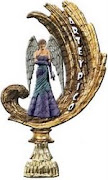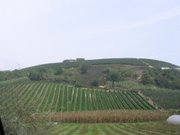I really believe that knowledge brings to understanding, and that this should be sought in every aspect of our life. I was saddened when I read the words that the newspapers reported today about the Pope's mention of the bizantine emperor and Mohamad.. I am Catholic, and I feel unconfortable when I see something like that. I cannot understand very well, considering that so many efforts of the Church are spent towards improving the dialogue between countries and religions. Wasn't the dream of John-Paul II to have a meeting in Jerusalem with a Jewish Rabbi and a Muslim religious authority? Anyway, I hope that we will continue to promote dialogue and understanding, especially in this moment where so much hate is present in the world.
Anyway, long introduction to say that I just finished to read two very interesting books written by Oriental authors.
The first is called 'The White Castle: a novel', by Orham Pamuk (I actually read it in Italian. The Italian title is 'Il castello bianco'). This was one of my mom's gifts for my birthday. It's a very interesting novel, sometimes a bit hard to read, because the style of the author is very descriptive.. but probably very appropriate for the story. The novel is set in the XVII century. An Italian guy is made prisoner by the Turkish and is able to escape death by showing his knowledge in medicine (sometimes less real than what he pretends to have). He is taken as slave by a sort of scholar, acquainted with the sultan, who's fascinated by the books that he was bringing with himself, and by what he knows, not only as scientific knowledge, but also personally, as he lived in such a different country. They have a very strange relation, where it's not always clear who's the 'slave' and who's the 'master'. The 'master' decides that they have to find out the truth about men and themselves by writing together about everything that they did. This becomes an extremely defatiguating task, in the end, for both of them. At the same time, the sultan requires new ideas and books from the master, and he actually has the 'slave' write them for him. The two people, moreover, also look very much alike physically. So, one of the main themes is also the sense of identity/identification, and there is a very special ending that I'm not going to give away. In the end, I think the book had some extremely interesting ideas, and is worth reading it especially in this moment where the dialogue between Western/Eastern cultures (and Christian/Muslim in particular) seems to be so hard.
This was one of my mom's gifts for my birthday. It's a very interesting novel, sometimes a bit hard to read, because the style of the author is very descriptive.. but probably very appropriate for the story. The novel is set in the XVII century. An Italian guy is made prisoner by the Turkish and is able to escape death by showing his knowledge in medicine (sometimes less real than what he pretends to have). He is taken as slave by a sort of scholar, acquainted with the sultan, who's fascinated by the books that he was bringing with himself, and by what he knows, not only as scientific knowledge, but also personally, as he lived in such a different country. They have a very strange relation, where it's not always clear who's the 'slave' and who's the 'master'. The 'master' decides that they have to find out the truth about men and themselves by writing together about everything that they did. This becomes an extremely defatiguating task, in the end, for both of them. At the same time, the sultan requires new ideas and books from the master, and he actually has the 'slave' write them for him. The two people, moreover, also look very much alike physically. So, one of the main themes is also the sense of identity/identification, and there is a very special ending that I'm not going to give away. In the end, I think the book had some extremely interesting ideas, and is worth reading it especially in this moment where the dialogue between Western/Eastern cultures (and Christian/Muslim in particular) seems to be so hard.
The second book that I just finished was a gift by my sister for my birthday. It was called 'The kite runner' by Khaled Osseini (Italian title: 'Il cacciatore di aquiloni' - and again I read it in Italian).  This book is absolutely amazing, and I would recommend it to everyone. It's not difficult to read at all, and it's actually hard to stop reading it. Although, it has some very rough scenes that can be disturbing. It's the story of a boy (Amir) that grows up in Kabul, Afghanistan. He is born in a well-off family, but his mother dyes giving birth to him. He loves and admires his father, but it's very difficult for him to gain his attention and esteem. He grows up with another boy (Hassan), who's an 'hazara', considered as an inferior race, and who's the son of the housekeeper. They are very close, but in his head, our protagonist is not completely sure he can call him 'friend', since he's from a lower class/race. On the contrary, his father treats him as a son, and is a very strong believer in people's equality, and he's a corageous man, never submitted to anyone, including the religious people who are slowly taking power in Afghanistan. The book goes throughout the history of Afghanistan, from the king to the occupation by Russians to the took of power by the Talebans. When the Talebans arrive and impose awfully strict and inhumane rules, the family escapes. But before this, some terrible thing occurs in the life of Amir and Hassan, that separates them abruptly, and burdens Amir with a huge sense of guilt. When the family escapes from Afghanistan, they go to California (close to San Francisco), and have to start a life from the beginning. The memory of Afghanistan tends to fade.
This book is absolutely amazing, and I would recommend it to everyone. It's not difficult to read at all, and it's actually hard to stop reading it. Although, it has some very rough scenes that can be disturbing. It's the story of a boy (Amir) that grows up in Kabul, Afghanistan. He is born in a well-off family, but his mother dyes giving birth to him. He loves and admires his father, but it's very difficult for him to gain his attention and esteem. He grows up with another boy (Hassan), who's an 'hazara', considered as an inferior race, and who's the son of the housekeeper. They are very close, but in his head, our protagonist is not completely sure he can call him 'friend', since he's from a lower class/race. On the contrary, his father treats him as a son, and is a very strong believer in people's equality, and he's a corageous man, never submitted to anyone, including the religious people who are slowly taking power in Afghanistan. The book goes throughout the history of Afghanistan, from the king to the occupation by Russians to the took of power by the Talebans. When the Talebans arrive and impose awfully strict and inhumane rules, the family escapes. But before this, some terrible thing occurs in the life of Amir and Hassan, that separates them abruptly, and burdens Amir with a huge sense of guilt. When the family escapes from Afghanistan, they go to California (close to San Francisco), and have to start a life from the beginning. The memory of Afghanistan tends to fade.
Amir grows up, gets married, and has almost forgotten Hassan until a phone call reaches him.. and he has to go back to Afghanistan. Read the book if you want to see how it ends. It's wonderful because it really makes you have a feeling for what the poor Afghan people have gone through in the last century of their history.. and also because it's a great description of human soul. We are forced to understand the reasons behind the characters' actions, and we don't know if we would have behaved differently in that context. And still, there are enough different characters to let you understand that actions are not simply driven by the cultural context. It's also a story of human growth, and it deals with the relation between man and God, and men and religion. I've been really touched by this book, and I really hope that at least someone who reads this post is going to read it.
Friday, September 15, 2006
Due libri provenienti dall'Oriente
Subscribe to:
Post Comments (Atom)







No comments:
Post a Comment